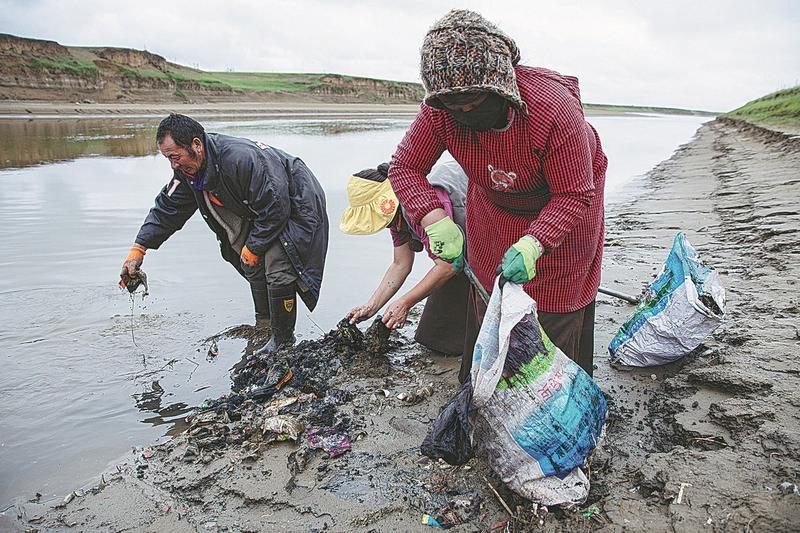 Farmers clean up garbage in Zoige, Sichuan province, where the Heihe River empties into the Yellow River, in July. The farmers patrol the Heihe once or twice a week, and the Yellow River once a month, to clean up and reinforce the banks. (JIANG HONGJING/XINHUA)
Farmers clean up garbage in Zoige, Sichuan province, where the Heihe River empties into the Yellow River, in July. The farmers patrol the Heihe once or twice a week, and the Yellow River once a month, to clean up and reinforce the banks. (JIANG HONGJING/XINHUA)
Chinese authorities unveiled an ambitious action plan on conserving the Yellow River, the country's second longest, on Wednesday, vowing to restore 700,000 hectares of degraded natural forest and treat almost 1.4 million hectares of land suffering from desertification in its basin by 2025.
Issued on Wednesday by 12 central government bodies, including the Ministry of Ecology and Environment and the Ministry of Water Resources, the action plan is the latest example of the country's strengthened endeavors to protect the watercourse dubbed the mother river of the Chinese nation.
Issued on Wednesday by 12 central government bodies, including the Ministry of Ecology and Environment and the Ministry of Water Resources, the action plan is the latest example of the country's strengthened endeavors to protect the watercourse dubbed the mother river of the Chinese nation
Chinese central authorities have attached increasingly greater importance to protecting the river, as the country forges ahead with the construction of an ecological civilization, a concept promoted by President Xi Jinping for balanced and sustainable development featuring harmonious coexistence between man and nature.
ALSO READ: Yellow River protection prioritized
Xi has presided over two symposiums on ecological protection and the high-quality development of the Yellow River Basin.
In the latest one held in Jinan, capital of Shandong province, in October last year, for example, he called for unremitting efforts to ensure that the Yellow River will always benefit the Chinese nation.
He said provincial-level regions along the Yellow River should stick to putting the environment first and being committed to green development.
Aside from measures for ecological conservation and remediation, the action plan also listed water pollution control as one of the priorities in protecting the Yellow River.
By 2025, the country will eradicate from the basin all water bodies with quality below Grade V, the worst level in the country's five-tier water quality system for surface water. The water quality in the middle and upper reaches of the Yellow River will reach Grade II, it said.
ALSO READ: Conservation drive helps Yellow River headwaters flow freely
Grade II quality means that the water can be used directly for drinking. According to the Ministry of Ecology and Environment, the Yellow River had Grade III water quality all through its central trunk last year.
The ministry said a special campaign will be rolled out to beef up environmental protection facilities in urban areas. Major focuses in this campaign are to strengthen the wastewater collection network, the disposal of sludge generated from sewage disposal and the treatment of black and odorous water bodies.
By 2025, all industrial parks in the basin will have facilities for the concentrated disposal of their sewage, it said. By that time, at least 90 percent of black and odorous water bodies in the urban areas of county-level cities are expected to be eliminated.
ALSO READ: Yellow River's power of change
Drafted in close accordance with the country's socioeconomic development situation, the action plan aims to synergize environmental and ecological conservation and stable, high-quality economic growth, according to a news release from the Ministry of Ecology and Environment on Wednesday.
To reach the goal, a series of major environmental management projects, preferential policies and pilot programs will be introduced, it noted.
The central government, for example, will increase its transfer payments to areas key for ecosystem operation. Intensified efforts will be made in the basin to improve an ecological compensation mechanism that asks downstream areas to economically reward their upstream neighbors for water quality improvement.
Demonstration projects on utilizing reclaimed water will be launched in water-deficient areas, the ministry said. There will also be pilot programs on the application of intelligent environmental monitoring in the basin.


